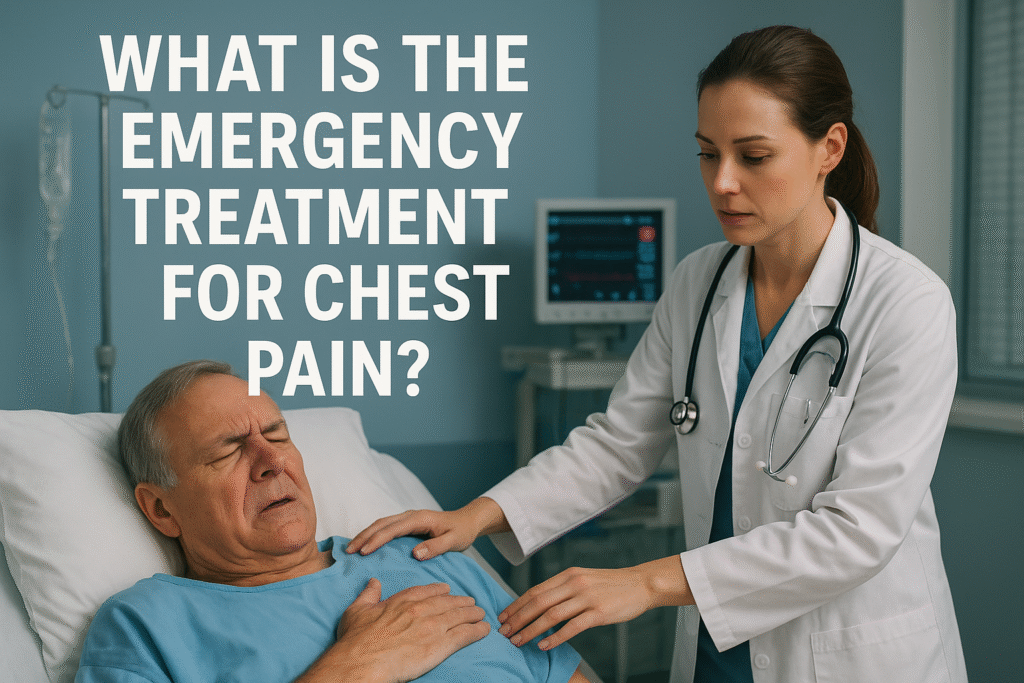If someone has new or severe chest pain act fast Call emergency services right away Chew one adult aspirin if the person is not allergic and rescue personnel or the dispatcher says to do so If the person becomes unresponsive start CPR and use an automated external defibrillator if available These steps buy time until the hospital can do an ECG blood tests and urgent treatments like clot removing therapy or angioplasty.
When chest pain is an emergency
There are several potential causes of chest pain. Some are relatively benign and some are fatal. A blocked coronary artery is a heart attack. The sooner you get medical attention, the less damage there is and the better your chance of survival.
What to do right away
- Call local emergency services and detail your symptoms.
- Sit or lie down and remain calm while you wait for help.
- If you are awake and not allergic, take a chewable aspirin if ordered by the dispatcher or a physician.
- If nitroglycerin was prescribed to you and your blood pressure is normal then take it.
- If the person is unresponsive, begin CPR and follow the dispatcher’s instructions until help arrives.
What emergency responders do first
EMS personnel assess airway breathing and circulation. They put cardiac monitors on and give a 12 lead ECG to see if they’ve had a heart attack. When it is safe, they give aspirin and nitroglycerin. They track and deliver patients swiftly to the appropriate hospital.
What to expect first in the emergency department
- Quick evaluation and serial vital signs.
- A 12-lead ECG to look for a blockage of the arteries.
- Blood sampling to determine cardiac biomarkers (for example, troponin).
- O 2 If O 2 saturation less than normal or patient breathless.
- IV lines and pain and blood flow stabilizing drugs.
- If a heart attack is diagnosed the team organises emergency opening of arteries or fibrinolysis if appropriate.
Common emergency treatments explained
- Aspirin is administered early if indicated to decrease clot growth.
- Nitroglycerin dilates blood vessels and can relieve chest pain if it does not lower the blood pressure.
- Antiplatelet drugs and anticoagulants restrict clot growth in the setting of acute coronary syndromes.
- The best treatment for occluded vessels is speedy reperfusion by angioplasty, whenever available.
Oxygen is not universal and is provided on the basis of oxygen saturation and respiration. cpr. heart.
What not to do
- Don’t waste time Googling symptoms instead of calling emergency services.
- Don’t try to transport yourself to the hospital if an ambulance can get there safely.
- Don’t take medication that was prescribed for another person or use unprescribed remedies.
- Do not give aspirin to children, or anyone who is advised against it by a clinician.
Special signals that tell you help, get now
- Squeezing chest pressure or heaviness that doesn’t go away
- Pain in Your Arm Neck Jaw Back or Stomach
- Sudden outbreath diaphoresis lightheadedness or blacking out
- Abrupt fall or loss of consciousness
If you notice any of these, call 911.
Outlook after emergency treatment
- You may be taken to a cardiac catheterization lab for artery-opening treatment.
- You will be monitored, and treated for heart recovery and prevention.
- Even if test results don’t indicate a heart attack you may be kept for observation and additional tests to look for other causes.
- An appointment for follow up with a cardiologist or your primary care physician is typically scheduled prior to discharge.
Handy-pocket checklist to have now
Keep them in an accessible location gathered and such.
Identification and medical ID card
List of medicines and allergies
Both your primary doctor and an emergency contact telephone numbers
Any prescribed nitroglycerin in an original labeled container
If chest pain begins then this is the simple action plan
Call emergency services right away
Take only if a dispatcher or health care professional says it’s safe for you to do so, and dispatched in response to cardiovascular symptoms, such as chest pain.
If your blood pressure is normal, take your prescribed nitroglycerin.
If the person is not responsive begin CPR and retrieve an automated external defibrillator if one is available
Extra points to know
Oxygen is beneficial when levels of oxygen are low unfortunately it isn’t given to all people with chest pain. Contemporary recommendations reserve routine use of oxygen for patients with open hypoxemia.
Tests of the ECG and troponin are central for making a diagnosis, but may need to be repeated to catch an early heart attack.
Swift treatment is key to better consequences and less long term damage.
Final takeaway
Chest pain is an extremely dangerous symptom. Do not delay; call emergency Care Treatment right away. Stop and wait for pain to subside. Early, if recommended, aspirin and prompt medical care increase survival, recovery. Maintain a basic list and promulgate emergency orders in a timely manner. To schedule your appointment with the highest standard of care, visit Sahara West Urgent Care on our website, where you can also explore more informative blogs



